Women all over the world play a subservient role to men, it is seen as the traditional role in which women play in society. Traditionally in Thai culture women functioned solely as housewives whose position was centered around her husband and family. Though Thailand is modernized and has adapted to be more globalized with women entering the workforce, even leading certain sectors, women still maintain their housewife identity in addition to a working one. Religion, traditional customs, and political structure continue to influence the overall widespread adoption and necessity for housewives across thailand.
Religion has had a significant influence on Thailand and it’s rural communities throughout the country. The majority of Thai people follow a Buddhist or Muslim lifestyle, resulting in a unique combination of values and it’s effects on the role of women. Female adherents in both religions are to present themselves as modest, a practice that extends itself deep into the life of women controlling how they present themselves, especially in rural communities where religion is the center of society. Religion as a lifestyle means the bulk of traditional customs develop from religious practice, practices that are different for women and men. As children grow up in buddhist culture, boys transition from school into the monastery while girls stay at home. This perpetuates the idea that a woman’s place is in the house and that men have a more important role in religion than women do, further demonstrated by women’s duties at the wat or temple is similar to housework. Furthermore there isn’t a strong political structure to enforce an equal role for women and men. Without a political, religious, or cultural support for women to expand within, the role of the housewife prevails while their responsibilities expand. All in a day’s work for these Thai housewives.
-
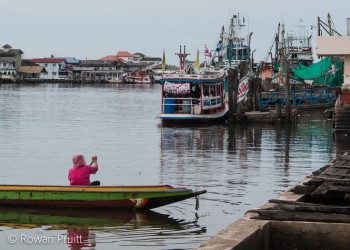
Duty to the Sea
Woman in the Pak Phanang rows her family’s long boat back to shore. Fishing is a significant economic sector for the district and women are often the facilitators of the market place and the capture of the fish alongside their male counterparts.
Pak Phanang, Thailand
-

Duty to Community
These two women of the Sea Gypsy village rests from the hot sun on the porch watching a thai television show. Community among women is built through shared experience and separation from men in the village during day to day responsibilities, resulting in a strong female bond.
Koh Lanta, Thailand
-
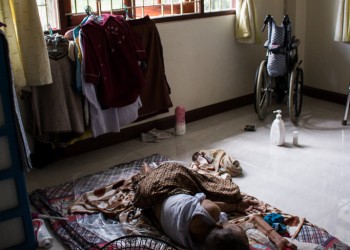
Duty to Mother
One mother houses her mother in the Asian tradition of filial piety, the deep respect and responsibility of caring for one's elder. The eldest woman lays peacefully surrounded by her loving family that supports her as her final days are catered to fully.
Chiankhao Sub-district, Chalermprakiat District of Nakhon Si Thammarat, Thailand.
-
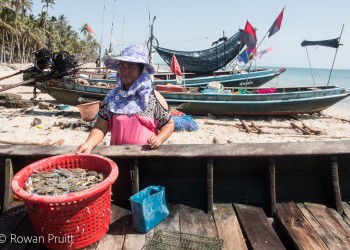
Duty to Fish
This woman carries the newly caught crabs away from the boat, wear the crab will then be separated by size and subsequently worth by one of her peers. Women’s role as in fisherman’s village is different in a housewives nature due to their inclusion in the fishing process undergoing extensive manual labor in addition to their expertise on the crabs and market value.
Pak Phanang, Thailand
-
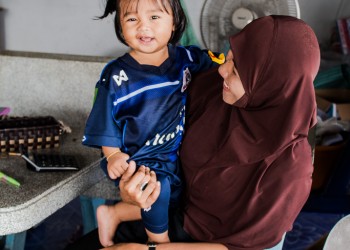
Duty to Child
This woman in a muslim fisherman’s village laughs with her child and other women from the community as they entertain themselves while managing the books and preparing for the market. Because of women’s relationship to her home, women are often in control of the household’s economy playing an important role in children’s education and managing their quality of life.
Muslim Fishermen Village, Nakhon Si Thammarat, Thailand
-
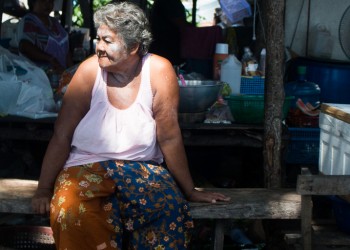
Duty to Lead
This woman functions as the supervisor of the women in her village around her as she overlooks the villages ongoings including preparing for the market, taking care of the children, and selling freshly made snacks for passing villagers. The women around her seemed to look at her with respect as an elder in the community.
Pak Phanang, Thailand
-
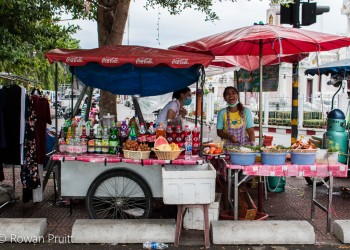
Duty to the Market
Two young girls laugh together from neighboring market stands. One selling refreshments, another selling rice noodle soup that she prepares then and there. The market is a very lively with lots of interaction between locals while being many women and their family’s livelihood.
Nakhon Si Thammarat, Thailand
-

Duty to Spouse
Wife continues to wear her wedding ring long after husband’s death, demonstrating her love and faith to her spouse and their relationship.
Chiankhao Sub-district, Chalermprakiat District of Nakhon Si Thammarat, Thailand.
-
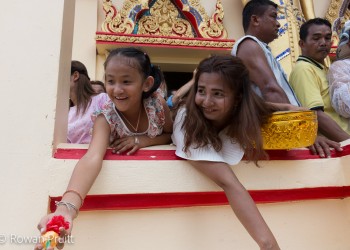
Duty to Faith
Within Buddhist traditional ordinations, women’s role is to celebrate alongside their families and communities as men and boys transition to monks. This woman and her child are throwing taans, coins wrapped in ribbons in the shape of flowers, from the steps of the wat. The people below scatter to catch the good luck and blessings the taans represent.
Chalermprakiat District of Nakhon Si Thammarat, Thailand.
-
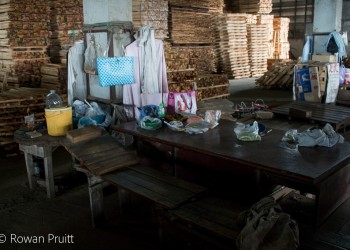
Duty to Provide
Evidence of women in a lumber mill as the leave their break area to label the wood. This female space in a stereotypically male capacity provides juxtaposition of what is expected of women as they exist together with the men of the lumber mill. Women because of their inferior status in society leads more women to be subjected to poverty which means many women seek out employment beyond the household despite level of education. This lumber mill is one of those places in the Nakhon Si Thammarat area.
Nakhon Si Thammarat, Thailand.
-
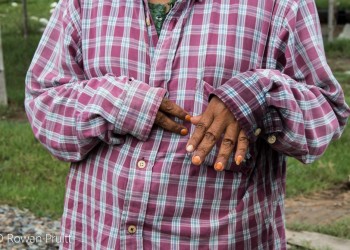
Duty to Beauty
As one woman speaks to another, she shows off her nails painted orange. While living and working in a muslim fisherman’s village that functions as a cooperative, this woman still manages to maintain certain standards of beauty.
Muslim Fishermen Village, Nakhon Si Thammarat, Thailand
-

Duty to Feed, Duty to Clean
Dishes pile high in this woman’s kitchen after providing a meal for her family and guests, symbolizing the dual responsibilities for women to cook and clean.
Chiankhao Sub-district, Chalermprakiat District of Nakhon Si Thammarat, Thailand.
-
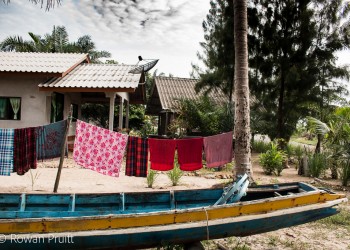
Duty to Clothe
Outside a home in a muslim fisherman’s village stretches a clothesline with various cloths drying and a retired boat.
Muslim Fishermen Village, Nakhon Si Thammarat, Thailand
Resources
http://www.wikigender.org/wiki/womens-roles-and-poverty-eradication-in-the-rural-area/
http://www.wikigender.org/wiki/the-role-and-rights-of-thai-woman-from-past-to-present/
http://www.thaiwaysmagazine.com/thai_article/1911_thai_women_status/thai_women_status.html












